
Indonesia, officially the Republic of Indonesia, is a country in Southeast Asia and Oceania between the Indian and Pacific oceans. It consists of over 17,000 islands, including Sumatra, Java, Sulawesi, and parts of Borneo and New Guinea. Indonesia is the world's largest archipelagic state and the 14th-largest country by area, at 1,904,569 square kilometres. With over 275 million people, Indonesia is the world's fourth-most populous country and the most populous Muslim-majority country. Java, the world's most populous island, is home to more than half of the country's population.

The history of Indonesia has been shaped by geographic position, its natural resources, a series of human migrations and contacts, wars of conquest, the spread of Islam from the island of Sumatra in the 7th century AD and the establishment of Islamic kingdoms, as well as by trade Bowls, Jars, Jugs and so on, economics and politics. Indonesia is an archipelagic country of 17,000 to 18,000 islands stretching along the equator in South East Asia. The country's strategic sea-lane position fostered inter-island and international trade; trade has since fundamentally shaped Indonesian history. The area of Indonesia is populated by peoples of various migrations, creating a diversity of cultures, ethnicities, and languages. The archipelago's landforms and climate significantly influenced agriculture and trade, and the formation of states. The boundaries of the state of Indonesia match the 20th-century borders of the Dutch East Indies.
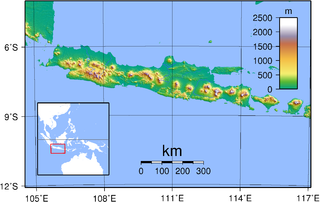
Java is one of the Greater Sunda Islands in Indonesia. It is bordered by the Indian Ocean to the south and the Java Sea to the north. With a population of 148.76 million people, Java is the world's most populous island, constituting approximately 55% of the Indonesian population.
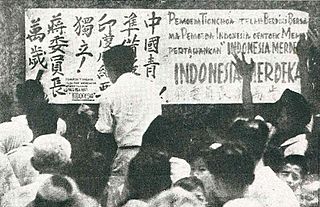
Chinese Indonesians and colloquially Chindo or just Tionghoa are Indonesians whose ancestors arrived from China at some stage in the last eight centuries.
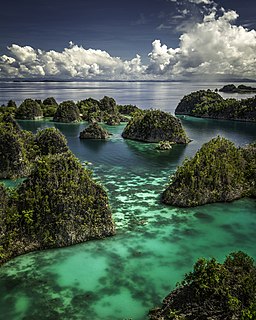
Tourism in Indonesia is an important component of the Indonesian economy as well as a significant source of its foreign exchange revenues. Indonesia was ranked at 20th in the world tourist Industry in 2017, also ranked as the ninth-fastest growing tourist sector in the world, the third-fastest growing in Asia and fastest-growing in Southeast Asia. In 2018, Denpasar, Jakarta and Batam are among of 10 cities in the world with fastest growth in tourism, 32.7, 29.2 and 23.3 percent respectively. The tourism sector ranked as the 4th largest among goods and services export sectors.
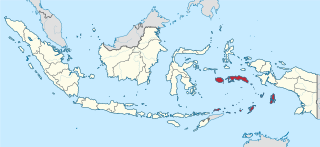
Maluku is a province of Indonesia. It comprises the central and southern regions of the Maluku Islands. The main city and capital of Maluku province is Ambon on the small Ambon Island. The land area is 62,946 km2, and the total population of this province at the 2010 census was 1,533,506 people, rising to 1,848,923 at the 2020 Census. The official estimate as at mid 2021 was 1,862,626. Maluku is located in Eastern Indonesia. It is directly adjacent to North Maluku and West Papua in the north, Central Sulawesi, and Southeast Sulawesi in the west, Banda Sea, East Timor and East Nusa Tenggara in the south and Arafura Sea and Papua in the east.

Hinduism in Indonesia, as of the 2018 census, is practised by about 1.74% of the total population, and almost 87% of the population in Bali. Hinduism is one of the six official religions of Indonesia. Hinduism came to Indonesia in the 1st-century through traders, sailors, scholars and priests. A syncretic fusion of pre-existing Javanese folk religion, culture and Hindu ideas, that from the 6th-century also synthesized Buddhist ideas as well, evolved as the Indonesian version of Hinduism. These ideas continued to develop during the Srivijaya and Majapahit empires. About 1400 CE, these kingdoms were introduced to Islam from coast-based Muslim traders, and thereafter Hinduism mostly vanished from many of the islands of Indonesia.
Bawean is an island of Indonesia located approximately 150 kilometers north of Surabaya in the Java Sea, off the coast of Java. It is administered by Gresik Regency of East Java province. It is approximately 15 km (9.3 mi) in diameter and is circumnavigated by a single narrow road. Bawean is dominated by an extinct volcano at its center that rises to 655 meters above sea level. Its population as of the 2010 Census was about 70,000 people, but more than 26,000 of the total were temporarily living outside, working in other parts of Indonesia, Singapore and Malaysia). As a result, females constituted about 77% of the actual population of the island, which is thus often referred to as "the Island of Women". The 2020 Census revealed a population of 80,289.

Shrimp paste or prawn sauce is a fermented condiment commonly used in Southeast Asian and Southern Chinese cuisines. It is primarily made from finely crushed shrimp or krill mixed with salt, and then fermented for several weeks. They are either sold in their wet form or are sun-dried and either cut into rectangular blocks or sold in bulk. It is an essential ingredient in many curries, sauces and sambal. Shrimp paste can be found in many meals in Cambodia, Indonesia, Laos, Malaysia, Myanmar, the Philippines, Singapore, Thailand, and Vietnam. It is often an ingredient in dip for fish or vegetables.
John Stanley Melville Keay FRGS is a British historian, journalist, radio presenter and lecturer specialising in popular histories of India, the Far East and China, often with a particular focus on their colonisation and exploration by Europeans. In particular, he is widely seen as a pre-eminent historian of British India. He is known both for stylistic flair and meticulous research into archival primary sources, including centuries-old unpublished sources.
Wisma 46 is a 261.9-meter tall skyscraper located in the BNI City complex at Jalan Jenderal Sudirman in Jakarta, Indonesia. The 46-floor office tower features an 10 m (33 ft) antenna spire, and was completed in 1996 under the design by Zeidler Roberts Partnership and DP Architects Private Ltd.
Tomé Pires was a Portuguese apothecary from Lisbon who spent 1512 to 1515 in Malacca immediately after the Portuguese conquest, at a time when Europeans were only first arriving in Southeast Asia. After his arduous experiences in India and the East Indies, he headed the first official embassy since the 14th century from a European nation in China, where he died.

The Malay Archipelago is a book by the British naturalist Alfred Russel Wallace which chronicles his scientific exploration, during the eight-year period 1854 to 1862, of the southern portion of the Malay Archipelago including Malaysia, Singapore, the islands of Indonesia, then known as the Dutch East Indies, and the island of New Guinea. It was published in two volumes in 1869, delayed by Wallace's ill health and the work needed to describe the many specimens he brought home. The book went through ten editions in the nineteenth century; it has been reprinted many times since, and has been translated into at least twelve languages.

China and Indonesia or Sino-Indonesian relations established formal diplomatic relations in 1950. Prior to this, for many centuries, the two countries maintained a variety of relations mainly in informal trade. Under Sukarno’s presidency, from 1945 to 1967, relations with China deepened, as in the early 1960s Sukarno embarked on a series of aggressive foreign policies under the rubric of anti-imperialism and personally championed the Non-Aligned Movement. These developments led to increasing friction with the West and closer relations both with China and the USSR.
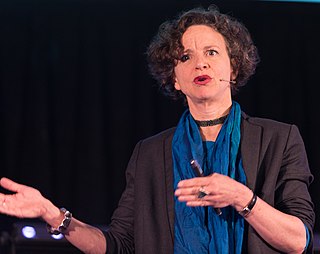
Elizabeth Pisani is a British-American epidemiologist, public health consultant, author and journalist. She is an academic researcher and the director of Ternyata Ltd., a public health consultancy based in London, UK. Her research investigates the ways in which politics, economics and culture influence public health. This has included markets for substandard and falsified medicines and HIV. Before this, Pisani was a journalist who worked as a correspondent for Reuters in several Asian countries.
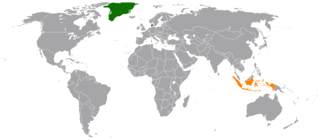
Denmark and Indonesia established diplomatic relations in 1974. Denmark has an embassy in Jakarta, and Indonesia has an embassy in Copenhagen. Bilateral relations are strong, as well as the humanitarian response to the December 2004 Indian Ocean tsunami, which claimed the lives of 45 Danes. In 2015, after focusing on China and South Korea, Denmark is gearing up to enhance its relations with Indonesia, hoping that it will help Denmark to build strong ties with the whole Southeast Asian region.

Gresik Regency is a regency within East Java Province of Indonesia. As well as a large part of the Surabaya northern and western suburbs, it includes the offshore Bawean Island, some 125 km to the north of Java and Madura. The regency's administrative centre is the town of Gresik, about 25 km to the northwest of Surabaya. Gresik Regency is also part of Gerbangkertosusila, the metropolitan region of Surabaya.
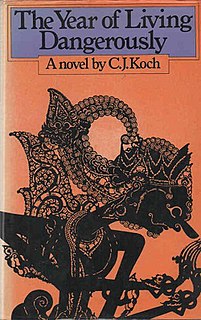
The Year of Living Dangerously is a 1978 novel by Christopher Koch in which an Australian journalist, a Chinese-Australian photojournalist and a British diplomat interact in Indonesia in the summer and autumn of 1965. Set primarily in the Indonesian capital city of Jakarta, it also describes a partly fictionalized version of the events leading up to the coup attempt by the Communist Party of Indonesia on September 30, 1965.
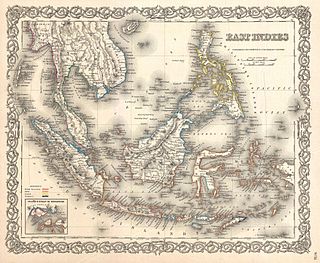
Indonesia is the common and official name to refer to the Republic of Indonesia or Indonesian archipelago; however, other names, such as Nusantara and East Indies are also known. Some names are considered obsolete and confined to certain periods of history, while some might be more geographically specific or general.
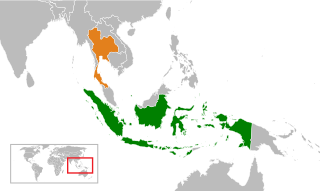
Indonesia and Thailand have officially established diplomatic ties on 7 March 1950. The two countries have since enjoyed a cordial bilateral relationship. Both countries have established embassies in each capitals, Indonesia has their embassy in Bangkok and consulate in Songkhla, while Thailand has their embassy in Jakarta. High rank stately visits has been conducted for years. Both nations are the founders of ASEAN and the members of Non-Aligned Movement and APEC. Indonesia and Thailand are viewed as natural allies. Indonesia is also appointed as observer in Cambodian–Thai border dispute.
















